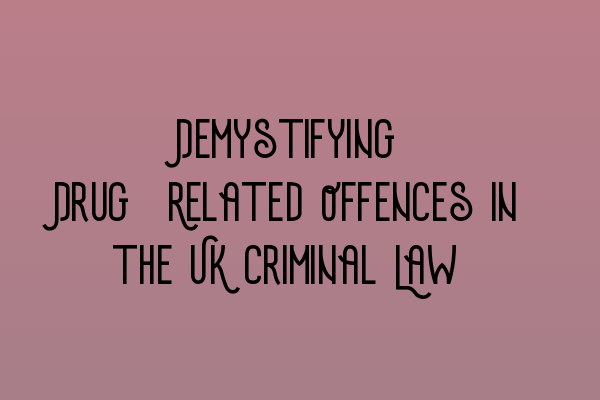Demystifying Drug-Related Offences in UK Criminal Law
Welcome to the SQE Criminal Law & Practice Law UK blog! In this post, we will delve into the intricacies of drug-related offences in the UK criminal law system. Whether you are a law student, legal professional, or simply interested in understanding this specific area of law, this article is for you.
Understanding Drug-Related Offences
Drug-related offences encompass a wide range of criminal activities involving drugs, including possession, supply, production, and trafficking. The UK criminal law treats drug offences seriously, recognizing the harm they can cause to individuals and society as a whole.
In order to effectively defend clients facing drug-related charges or prosecute offenders, it is imperative to have a thorough understanding of the relevant legislation and legal procedures. SQE Criminal Law & Practice Law UK offers comprehensive SQE 1 and SQE 2 preparation courses to equip aspiring solicitors with the necessary knowledge and skills to navigate complex drug-related cases.
An Overview of Drug Offences
Drug offences in the UK are primarily governed by the Misuse of Drugs Act 1971. This legislation classifies drugs into different categories, known as schedules, based on their potential harm and medicinal value. The penalties for drug-related offences vary depending on the type of drug, quantity involved, and the defendant’s role in the criminal activity.
Common drug-related offences include:
- Drug Possession: The act of knowingly having illegal drugs in one’s possession without a lawful excuse.
- Drug Supply: The intentional distribution or sale of controlled substances.
- Drug Production: The cultivation, manufacture, or production of illicit drugs.
- Drug Trafficking: The illegal transportation, importation, or exportation of drugs.
It is crucial for legal professionals to stay updated with the evolving legislation surrounding drug-related offences. The SRA SQE Exam Dates provide a valuable resource for aspiring solicitors looking to stay informed and prepared for the SQE exams, which cover various aspects of criminal law, including drug offences.
Challenges in Drug-Related Cases
Defending or prosecuting drug-related cases comes with its own set of challenges. The prosecution must establish that an offence has been committed and prove the defendant’s involvement beyond a reasonable doubt. On the other hand, defence lawyers must carefully examine the evidence, challenge the prosecution’s case, and present strong legal arguments to defend their clients’ interests.
Effective preparation and continuous professional development are essential for solicitors involved in drug-related cases. SQE 1 Practice Exam Questions and SQE 1 Practice Mocks FLK1 FLK2 offer valuable resources for aspiring solicitors to practice and enhance their knowledge of criminal law, ensuring they are well-equipped to tackle drug-related offences.
Conclusion
Drug-related offences pose significant challenges for legal professionals. Navigating through the complex legislation, understanding the intricacies of drug offences, and staying informed about the latest developments are all critical for successful outcomes in drug-related cases.
At SQE Criminal Law & Practice Law UK, we offer comprehensive SQE 1 and SQE 2 preparation courses to equip aspiring solicitors with the necessary knowledge and skills to excel in their legal careers. Visit our SQE 1 Preparation Courses and SQE 2 Preparation Courses pages to learn more about how we can help you succeed.
Remember, staying informed and continuously improving your understanding of drug-related offences will allow you to better serve your clients and contribute to the fair administration of justice.
For more information regarding the SQE exams, visit the SRA SQE Exam Dates page.
